 Picking up from the conclusion of the more satisfying (if less ambitious) J.J. Abrams-directed “The Force Awakens,” writer-director Johnson’s outing finds Rey (Daisy Ridley) trying to make contact with Luke Skywalker (an effective Mark Hamill) and convince him to help the Rebellion – err, Resistance – against the Empire – or First Order, as it’s now called. Meanwhile, bad-boy Kylo Ren’s (Adam Driver) allegiances are tested as he encounters supreme commander Snoke (a lame CGI creation embodied by Andy Serkis) while Leia’s efforts with the Resistance mostly revolve around convincing hot-head pilot Poe Dameron (Oscar Isaac) to cool his jets. In the “We Didn’t Really Need To Shoot This Department,” John Boyega’s ex-stormtrooper Finn (John Boyega) is back, partnered with a female mechanic (Kelly Marie Tran) as the duo fly to an intergalactic casino in order to find a safecracker (an awful performance from Benicio Del Toro, who looks like he’s just wandered off the set from his latest Heineken commercial) who can help shut down a First Order tracking device.
Picking up from the conclusion of the more satisfying (if less ambitious) J.J. Abrams-directed “The Force Awakens,” writer-director Johnson’s outing finds Rey (Daisy Ridley) trying to make contact with Luke Skywalker (an effective Mark Hamill) and convince him to help the Rebellion – err, Resistance – against the Empire – or First Order, as it’s now called. Meanwhile, bad-boy Kylo Ren’s (Adam Driver) allegiances are tested as he encounters supreme commander Snoke (a lame CGI creation embodied by Andy Serkis) while Leia’s efforts with the Resistance mostly revolve around convincing hot-head pilot Poe Dameron (Oscar Isaac) to cool his jets. In the “We Didn’t Really Need To Shoot This Department,” John Boyega’s ex-stormtrooper Finn (John Boyega) is back, partnered with a female mechanic (Kelly Marie Tran) as the duo fly to an intergalactic casino in order to find a safecracker (an awful performance from Benicio Del Toro, who looks like he’s just wandered off the set from his latest Heineken commercial) who can help shut down a First Order tracking device.
“The Last Jedi” manages to be both busy and boring at the same time – one misses the narrative economy of George Lucas’ storytelling throughout, so much that the movie feels less like a Star Wars movie and more like a typical Marvel product, with occasional moments that could be easily mistaken for outtakes from Luc Besson’s “The Fifth Element.” To his credit, Johnson doesn’t just recycle “The Empire Strikes Back” in his overwritten script (at least not nearly as much as Abrams’ predecessor repurposed the original “Star Wars”), but he still never seems to get it right, opening with a painful exchange between Poe and the First Order that’s dominated by humor totally foreign to this series, while cluttering the adventure with needless detours that detract from its more effective elements. Chief among the former are all the scenes between Finn and Tran’s Rose Tico, who end up in a subplot involving exploited animals and orphaned kids that feels like something out of another movie galaxy altogether (the entire casino sequence, in fact, would be awful in any cinematic universe). It’s debatable, though, what’s worse – that portion of the film or several wholly misjudged moments – one involving a free-floating “Space Leia” – that are simply baffling as to how they ended up in the final cut.
It’s not all trash-compactor material, at least. What works best are the scenes of Rey and Luke sparring – Ridley seems physically more adept here and Hamill gives easily the best performance of the original trilogy stars as a grizzled, though not altogether humorless, Skywalker. There’s even a cameo from another former Jedi that’s welcome and nicely executed, and when the movie stops to focus on them, the picture functions reasonably well.
Still, even there, all roads lead to one of the film’s – and this new trilogy’s – major problems, and that’s Adam Driver’s Kylo Ren. This would-be Vader’s tortured adventures are a real drag on the entire concept of the Disney movies: Kylo’s bad one moment, sad about his Mommy and Daddy the next – and his shifting allegiances are neither compelling nor convincing. With the “big bad” of this series being so unimpressive, it’s difficult to envision where a returning J.J. Abrams is going to make Episode IX relevant, especially when the plot strands left dangling here just aren’t very interesting. Not to mention that all the big scenes between Rey and Kylo end up bringing audiences right back to where they were in the last movie, with no advancement of the plot at all.
A rewrite from a more capable filmmaker would’ve undoubtedly helped “The Last Jedi,” which somehow ends up a more individualistic piece than “The Force Awakens” but less satisfying on a number of levels. Concluding with a head-scratcher of a final scene that should’ve been excised like a number of misjudged moments before it (Coming in 2019 from Disney: “Little Orphan Jedi, Part I of XX”), it’s a movie that never gets out of its own way as it encounters too much of the Dark Side in an increasingly tired Galaxy Far, Far Away. (PG-13, 152 mins.)
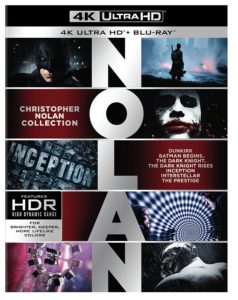 Nolan in 4K
Nolan in 4K
The year is wrapping up with one of the most anticipated 4K UHD releases: Warner’s seven-disc CHRISTOPHER NOLAN COLLECTION, offering BATMAN BEGINS, THE DARK KNIGHT, THE DARK KNIGHT RISES, INCEPTION, INTERSTELLAR, THE PRESTIGE and DUNKIRK in brand-new, HDR-enhanced UHD transfers (though without Dolby Atmos audio; Nolan apparently prefers the fidelity of his 5.1 mixes, housed here again in DTS MA tracks). The films are available separately or in Warner’s elaborate box-set release (there’s also a separate set for the UHD “Dark Knight Trilogy”).
Nolan’s newest film DUNKIRK (**½, 107 mins., PG-13) is likely to divide viewers into two camps: those who feel the picture is a brilliant piece of cinema, and everybody else. Despite the mostly positive reviews, I regrettably found myself in the latter camp as this clinical “immersive viewing experience” played itself out.
There’s no denying “Dunkirk” is technically brilliant and beautifully shot — like everything Nolan has made. Yet, the film is also emotionally empty, with no character development of any kind — and I realize that may have been Nolan’s point, to submerge the viewer (at times literally) into the mayhem of Dunkirk and the rescue mission of British troops surrounded by a faceless (and, here, nameless) enemy. Still, I found the final product sterile and cold. Instead of feeling an emotion at the end of the journey, I just felt exhausted and worn out from the endless barrage of bullets and explosions, which left me with an ear-splitting headache from a subwoofer that must have been cranked up too much (ditto for Hans Zimmer’s thankless score, which ventures into some Vangelis Lite territory at the end, to no discernible emotional effect).
 A few lines intended to convey the scattershot nature of war are thrown around here and there, but nothing is developed as Nolan spends most of the film showing an assault of near-misses and dire confrontations with “The Enemy,” including aerial dogfights that are surprisingly disjointed in their editorial presentation. The “story”, meanwhile, crosscuts between several characters — Mark Rylance’s pleasure boater, corralled into participating in the evacuation; Tom Hardy’s ace fighter pilot; Kenneth Branagh’s concerned admiral, and a young solider, played by Fionn Whitehead, whom most of the action revolves around — but somehow never connects together, making for a film that manages to be tense without ever really being suspenseful. And then it just ends.
A few lines intended to convey the scattershot nature of war are thrown around here and there, but nothing is developed as Nolan spends most of the film showing an assault of near-misses and dire confrontations with “The Enemy,” including aerial dogfights that are surprisingly disjointed in their editorial presentation. The “story”, meanwhile, crosscuts between several characters — Mark Rylance’s pleasure boater, corralled into participating in the evacuation; Tom Hardy’s ace fighter pilot; Kenneth Branagh’s concerned admiral, and a young solider, played by Fionn Whitehead, whom most of the action revolves around — but somehow never connects together, making for a film that manages to be tense without ever really being suspenseful. And then it just ends.
Although viewers were initially surprised by the thrifty running time (especially considering Nolan’s prior works), 107 minutes was ultimately more than sufficient for this kind of purely technical exercise — and while it’s still worthwhile to see on that level, and may enthrall some viewers on those grounds alone, “Dunkirk” sadly doesn’t offer more than that.
4K Rundown: Unsurprisingly, Warner’s 4K UHD presentation of “Dunkirk” looks and sounds phenomenal. The best of all seven transfers, the HVEC encoded “Dunkirk” transfer is dominated by effective use of HDR, striking contrasts and top detail, all of it giving the cinematography a depth and clarity not as prominently displayed in an otherwise very strong Blu-Ray platter. Both transfers include IMAX sequences presented as shot in 1.78 — and those scenes tend to possess a further clarity that are truly remarkable, compared to the 2.35 sections.
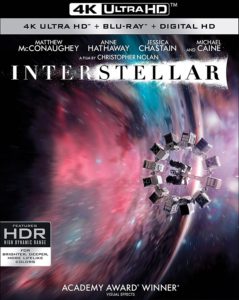 It’s tough to rag too much on a sci-fi film that does, at least, attempt to tell a genuine story augmented with “real science” in today’s age of mindless comic book fantasies. On the other hand, is it too much to ask for a film like Nolan’s INTERSTELLAR (***, 169 mins., PG-13) to be less convoluted and a bit more emotional – and by that I mean, actually move the viewer and not just throw up a group of characters crying hysterically on-screen? It’s a solid albeit frustrating film in that Nolan manages to captivate, and occasionally enthrall, the audience for nearly all of its lengthy running time, while the picture is nearly as unmoving as many of his works.
It’s tough to rag too much on a sci-fi film that does, at least, attempt to tell a genuine story augmented with “real science” in today’s age of mindless comic book fantasies. On the other hand, is it too much to ask for a film like Nolan’s INTERSTELLAR (***, 169 mins., PG-13) to be less convoluted and a bit more emotional – and by that I mean, actually move the viewer and not just throw up a group of characters crying hysterically on-screen? It’s a solid albeit frustrating film in that Nolan manages to captivate, and occasionally enthrall, the audience for nearly all of its lengthy running time, while the picture is nearly as unmoving as many of his works.
On the plus side, this tale of a depleted Earth in dire need of food is believably rendered, with farmer Matthew McConaughey called into captain a last-ditch mission at finding another home in a galaxy that, ordinarily, would be far, far away. However, thanks to a wormhole dispatched near Saturn, McConaughey and his band of fellow astronauts (including Anne Hathaway) are able to spearhead an expedition to several planets that offer the potential of sustaining life. Meanwhile, back on Earth, McConaughey’s family carries on without him while circumstances take a turn for the worse – and are exaggerated by the fact that hours that the crew passes in the remote galaxy are the equivalent of years back in the Milky Way.
Saying anything more about the plot, written by Nolan and his brother Jonathan, would be spoiling too much of the journey. Suffice to say a major actor (purposefully not mentioned in pre-release advertising) appears midway through the movie in a role that’s transparent in its dramatic function and instigates a downward spiral which “Interstellar” never entirely breaks out of. The opening act of the film effectively sets up the film’s setting and premise – which is remarkably free of environmental proselytizing – as well as McConaughey’s connection to his family. Yet once the journey begins – and the astronauts experience an initial stop on a planet with waves reaching the height of mountains – the film tends to move from one “event” to the next on an emotional flatline, while there are seemingly endless scenes with characters arguing over wormholes, relativity, gravity, black holes, and 5th dimensional beings. These conversations eventually become so dense that the movie nearly feels like the equivalent of a Universal ‘50s monster movie where someone like J. Carroll Naish would outline the reason why a giant insect was cavorting around the desert. It’s all techno-babble mumbo-jumbo, interesting to a point but overstuffed to a degree that you can just sense “Interstellar” is going to have a hard time appealing to audiences other than hardcore sci-fi geeks. Thankfully, the moments that sing truly do linger in the mind, and the resolution is a satisfying one.
4K Rundown: There’s no doubt that Paramount’s 4K UHD presentation of “Interstellar” is, in fact, spectacular in appearance, the movie receiving a strong assist from HDR that adds, once again, additional clarity and color to Nolan’s visuals. The film is enhanced as a result, even if the (okay, I’ll name him now) Matt Damon sequence still plays like a plot element lifted right out of an old “Star Trek” episode. Technically this is a marvelous transfer with the IMAX shot sequences being especially jaw-dropping (as with “Dunkirk,” the aspect ratio shifts from 1.78 to 2.35).
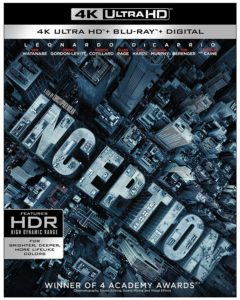 INCEPTION (**½, 148 mins., 2010, PG-13): One of the summer 2010’s biggest hits, “Inception” boasts all the hallmarks of a Nolan film: dense plotting, gorgeous visuals, grating (and incessant) Hans Zimmer music, and a determined, deadly-serious lead performance. What it lacks, as is often the case with Nolan’s work, is a soul – a heart that enables audiences to emotionally connect with its protagonists.
INCEPTION (**½, 148 mins., 2010, PG-13): One of the summer 2010’s biggest hits, “Inception” boasts all the hallmarks of a Nolan film: dense plotting, gorgeous visuals, grating (and incessant) Hans Zimmer music, and a determined, deadly-serious lead performance. What it lacks, as is often the case with Nolan’s work, is a soul – a heart that enables audiences to emotionally connect with its protagonists.
It’s another icy but compelling Nolan film where you consistently feel at arm’s length with its characters, and in this case, it’s regrettable since Nolan’s script engagingly toys with past genre films like “Brainstorm” and “Dreamscape” (at least from a conceptual angle), as “dream thief” Leonardo DiCaprio and his team (Joseph Gordon-Levitt, Tom Hardy, Ellen Page) attempt to break up the empire of dying Pete Postelthwaite by entering the dreams of his son Cillian Murphy — all to the benefit of their corporate competitor (and DiCaprio’s employer), Ken Watanabe.
Nolan layers the film with evocative, spectacular visual effects of cities folding over, of characters bending time and space and defying the laws of physics by entering one level of the dream-world and further, more mind-bending extensions within. It’s a spellbinding visceral experience, even if the movie is never as offbeat and weird as its premise suggests (the final level in Murphy’s ultimate “dream world” looks like a “Call of Duty” level and, indeed, plays like you’re watching a video game), while narratively the picture comes up short, marked by characters who function more like archetypes than real people. There’s not a lot of emotion generated in “Inception,” and Nolan does little to infuse the drama with anything more than DiCaprio’s quest to “get back to his kids,” with the actor doing his best Christian Bale imitation, clenching his jaw and frequently delivering dialogue that sounds like a FAQ for a word processing program. The utterly predictable final shot further leaves one let down by Nolan’s original screenplay.
What we’re left with is a movie that is the very embodiment of popular modern moviemaking: it’s “cool,” intricately made and spectacular on a technical level, yet leaves you wanting more from its core. One wonders whether Nolan will ever get to the level where his movies engage you emotionally instead of leaving you primarily marveling at how awesome they look.
4K Rundown: As is the case with most of the films in this set, “Inception” receives an expected boost from HDR and 4K enhanced detail, though it’s not a night/day difference over the Blu-Ray, which already looked stellar. The larger your set, the more likely you will be to notice a major difference between the two presentations. The DTS MA audio is swirling and widely engineered with effects and Hans Zimmer’s score.
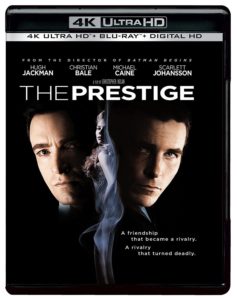 Inbetween the first and second installments in his Batman trilogy, Nolan helmed THE PRESTIGE (**½, 2006, PG-13, 130 mins.), one of two “period” films produced in 2006 involving sleight-of-hand and lead characters consumed by their talents.
Inbetween the first and second installments in his Batman trilogy, Nolan helmed THE PRESTIGE (**½, 2006, PG-13, 130 mins.), one of two “period” films produced in 2006 involving sleight-of-hand and lead characters consumed by their talents.
But while Neil Burger’s “The Illusionist” offered a protagonist who at least was utilizing his abilities for the purposes of love, the two dueling magicians in “The Prestige” only care about one-upping one another in a humorless film that looks great, is reasonably well-performed, but ultimately comes undone due to relentlessly unsympathetic characters and a silly climax that feels in part like a Shaggy Dog joke.
Hugh Jackman stars as Robert Angier, a magician who stands by and watches his wife (Piper Perabo) die in an accident that he holds competing showman Alfred Borden (Christian Bale) responsible for. Nolan and his brother Jonathan penned the script (from a novel by Christopher Priest), which then follows the attempts by Angier to uncover Borden’s secrets, particularly as the latter sees his career skyrocket thanks to a teleportation trick that constantly sells out the house. Angier’s attempts to understand Borden’s showstopper lead him to a snowy Colorado town that has running electricity, and an eccentric scientist (David Bowie) who lives in the hills and may just have a contraption that would make David Cronenberg proud.
“The Prestige” is atmospherically shot in light and shadow by Wally Pfister and benefits from the same visual gloss Nolan brought to “Batman Begins.” This is a grade-A production across the board, but the one-note script grows to be a problem as neither character is remotely sympathetic — Nolan drops whatever compassionate elements are left in Jackman and Bale’s characters as the duo outrageously try and climb to the top, with only Michael Caine’s fine supporting turn as Jackman’s manager offering any viewer identification. Scarlett Johansson’s character, meanwhile, proves to be a total bust, and the weird, Shyamalan-like finale doesn’t pack nearly the wallop it should since some of its aspects (without giving it all away) feel as if they’ve come out of left field.
After the smoke has cleared and “The Prestige” has played its hand, you’re left with a handsome but cold, detached movie that you have no emotional investment in seeing play out. Still, Nolan’s direction is so assured and the production so well-mounted that it’s hard to completely dismiss “The Prestige.” Just don’t expect the director to pull a rabbit out of the hat this time.
4K Rundown: Although distributed by Disney in North America, Warner’s 4K UHD of “The Prestige” is one of the best in the Nolan 4K Collection in terms of enhancements over its prior Blu-Ray. The picture’s already ravishing cinematography is boosted by the use of HDR, making for a robust technical presentation. DTS MA sound, meanwhile, offers a rough upgrade over Buena Vista’s PCM audio from their early-format BD release. (Fans should note the Blu-Ray housed in this set is also a new pressing with DTS MA audio).
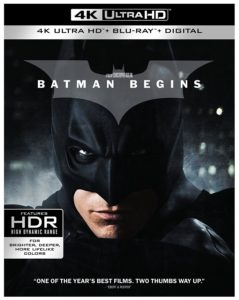 BATMAN BEGINS (***, 140 mins., 2005, PG-13): It’s easy to see why filmmakers have had such a difficult time trying to capture the exploits of Bob Kane’s Dark Knight on-screen. The inherent psychological aspects of the Bruce Wayne character, his inner-demons and guilt over the death of his parents, and the curious costume he wears are all obstacles one faces in trying to make a filmed adaptation of the DC Comics hero. From the campy Adam West-Burt Ward ‘60s TV show to Tim Burton’s uneven though entertaining box-office hits and Joel Schumacher’s poorly-received, decadent sequels, the live-action Batman productions have all illustrated — to one degree or another — the problems that bringing the super-hero’s adventures to the screen entail.
BATMAN BEGINS (***, 140 mins., 2005, PG-13): It’s easy to see why filmmakers have had such a difficult time trying to capture the exploits of Bob Kane’s Dark Knight on-screen. The inherent psychological aspects of the Bruce Wayne character, his inner-demons and guilt over the death of his parents, and the curious costume he wears are all obstacles one faces in trying to make a filmed adaptation of the DC Comics hero. From the campy Adam West-Burt Ward ‘60s TV show to Tim Burton’s uneven though entertaining box-office hits and Joel Schumacher’s poorly-received, decadent sequels, the live-action Batman productions have all illustrated — to one degree or another — the problems that bringing the super-hero’s adventures to the screen entail.
Christopher Nolan’s 2005 “Batman Begins” managed to duck many of the problems from previous adaptations, setting (along with Sam Raimi’s first two “Spider-Man” films) the standard for modern super-hero movies in the process.
An epic “re-imagining” of the hero that captures some of the essence of Frank Miller’s superb “Batman: Year One” comic book, “Batman Begins” is a deadly serious, ambitious, at-times enthralling entertainment that falters a bit during its final third, and does suffer from some pacing issues, including a lengthy backstory that takes a little long to play out.
Christian Bale makes for a superb Bruce Wayne, who we meet at the beginning as a young man searching for his soul. Having left Gotham City and his name to the point where he’s believed dead, Wayne encounters a mysterious man named “Ducard” (Liam Neeson) while serving time in a Far East prison. In a sequence reminiscent of “The Shadow,” Ducard tutors Wayne in the ways of the “League of Shadows,” a group attempting to bring justice to the world by tilting the axis of power in various global locales.
Wayne leaves the group behind, though, after he refuses to execute a criminal, and returns to find Gotham City in the same, depleted condition one will recall from the old Tim Burton films. Criminals run amok, including a city mobster (a miscast Tom Wilkinson) and an Arkham Asylum shrink (Cillian Murphy) who has more up his sleeve than just treating his patients. One good cop — Jim Gordon (Gary Oldman) — attempts to fight the injustice along with Wayne’s childhood pal-turned-D.A. Rachel Dawes (Katie Holmes), but their efforts are thwarted by a ring of corruption that extends to every nook and cranny of the dank metropolis.
Meanwhile, back at Wayne Manor, trusty butler Alfred (the wonderful Michael Caine) attempts to pick the troubled Bruce up by his bootstraps by indulging in his master’s latest interest: combating evil by becoming a one-man wrecking crew. Armed with weapons from Wayne Industries engineer Lucius Fox (Morgan Freeman), Bruce springs into action and fights his childhood traumas by becoming Batman, or — as Murphy at one point intones — “The Bat-Man!”
Impressively shot in widescreen in a way that looks more like the work of Ridley Scott than Burton or Schumacher’s efforts, Nolan’s “Batman Begins” starts well, if not a bit leisurely. Bale looks the part and is given the opportunity to carry the picture courtesy of Nolan and co-writer David S. Goyer. His interplay with Caine — who’s given one of his best roles in years — is tremendous, and being able to see veterans like Caine and Freeman together on-screen is worth the price of admission alone.
Nolan effectively illustrates Wayne’s guilt over his parents’ murder and perfectly sets up the springs that set his transformation into Batman in motion. Heck, we even get to see Batman doing some detective work — a cornerstone of the comics that was almost entirely lost amongst the bombastic action and effects of the previous (and subsequent) “Batman” films.
Though hailed by some as one of the genre’s all-time finest works, “Batman Begins” does boast its share of flaws, from an opening that takes too long to get going, to a crazy and not always effective climax. After doing such an impressive job setting up the plot, Nolan and Goyer come up with an overbearing finale where the villains attempt to turn Gotham’s residents against one another by contaminating the water supply. Their method? A chemical that — once sprayed through the air and in concert with the poisoned liquid — makes its victims hallucinate poor make-up effects.
This results in a weird, choppy climax that almost feels like “Escape From Gotham City,” except with Batman filling in for Snake Plissken. What’s worse is that the special effects are substandard — the affected Gothamites see Batman as a blurry figure with glowing eyes and light emitting from his mouth, much the same way that Michael Mann depicted vampires in “The Keep.” Needless to say it clashes with the quality of drama that came before it, while the “demise” of the nefarious Scarecrow is a bit funny — and not in an intended way, either.
The cast is also a mixed bag. Bale and Caine work so well together that they help to off-set some of the picture’s curious, and less effective, performances. Tom Wilkinson, a great British actor, seems misplaced here as an inner-city mobster. Cillian Murphy seems far too young as the shady Dr. Crane, with his over-the-top “look out for the Bat-Man!” line providing a few unintended chuckles for the audience I screened the movie with. What’s worse, Katie Holmes comes off as a complete lightweight against the likes of Bale, Caine, and Freeman, and her final scene with Bale is too pat and predictable, playing out like every other scene where Kirsten Dunst complains to Tobey Maguire in the “Spider-Man” films (Holmes was wisely replaced by Maggie Gyllenhaal in the “Dark Knight” sequel).
Hans Zimmer and James Newton Howard’s “tag team” soundtrack also doesn’t entirely click. Though propulsive and at times effective, it’s also highly forgettable. There’s no central thematic material to grasp onto, and their tiresome cue for the Batmobile chase — which sounds like what Samuel Barber might have come up with in an “Adagio For Batman” — stands as a miscalculation.
Ultimately, Nolan is enough of a craftsman and artist that the pros of “Batman Begins” outweigh the cons. Always exciting to watch and with strong central performances from Bale and Caine, this is a flawed but fascinating (if overly serious) take on the comic book legend.
4K Rundown: Wally Pfister’s cinematography is a standout in Warner’s 4K UHD release of “Batman Begins,” which is better able to handle the picture’s darker sequences with enhanced clarity and HDR than both its earlier DVD and Blu-Ray releases. Don’t expect a massive leap in detail here over the Blu-Ray, though (the movie is fairly soft in places all things considered), but the HDR alone and wider color gamut still have appreciable benefits for 4K owners.
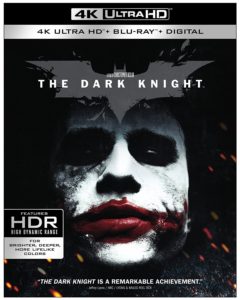 THE DARK KNIGHT (***, 151 mins., 2008, PG-13): Dark, foreboding, grim…those are just a few of the terms to describe the middle chapter in Nolan’s Batman trilogy.
THE DARK KNIGHT (***, 151 mins., 2008, PG-13): Dark, foreboding, grim…those are just a few of the terms to describe the middle chapter in Nolan’s Batman trilogy.
Picking up shortly after the events of “Batman Begins,” Gotham City is now besieged by attacks from a new criminal on the scene: The Joker (the late Heath Ledger), who manipulates the local crime bosses into supporting his reign of twisted terror. His insanity comes at the same time hope arrives in the form of new District Attorney Harvey Dent (Aaron Eckhart), a “White Knight” crusader whose bold prosecution of the city’s crooks makes him Target #1 among the thugs, now playing without rules under the Joker’s anarchy.
Bruce Wayne (Christian Bale) realizes that Dent is the city’s true hope for the future, especially since Batman is officially a vigilante in the eyes of the law and some residents, and even contemplates hanging up the bat suit so he can move on with former girlfriend Rachel Dawes (Maggie Gyllenhaal, effectively replacing the lightweight Katie Holmes). Unfortunately for Bruce, however, justice comes with a price, as he all too quickly realizes…
Technically dazzling yet fundamentally flawed in certain areas, “The Dark Knight” is a compelling, somewhat pretentious, overlong, yet often brilliantly realized comic book movie. Nolan and cinematographer Wally Pfister have once again produced a breathtaking looking picture with an unrelenting sense of dread that permeates every sequence. Ledger’s much acclaimed performance could’ve easily been a self-indulgent affair yet the actor seized the opportunity to craft a memorably off-kilter, truly insane villain that undoubtedly would’ve boosted Ledger’s career had he lived to see the movie’s release.
Yet The Joker is also, ironically, one of the film’s core problems: out of respect to the late actor, it seems that Nolan was slavish to retaining every shot of The Joker and “preserving his performance” as he’s said, to the point where the character overpowers everything else in the movie. Batman is basically treated like a secondary character once again, much like Michael Keaton was back in the original, Tim Burton-directed “Batman” to Jack Nicholson, and as a consequence the movie has an odd focus at times with no real center anchoring it down.
The tragic character of Harvey Dent, meanwhile, also complicates matters — after 2.5 hours I felt that Ledger’s Joker was plenty of “bad” for one movie to handle, and while I understand what Nolan was trying to say with the “Two-Face” character, dramatically it throws the story off-course in the final third to the degree where I was never convinced that his presence was entirely necessary.
The pacing also pushes Batman into the back seat in favor of a redundant succession of scenes where audiences are supposed to believe that the situation is under control, only to have The Joker throw it all into chaos. There should have been more pauses, more scenes to develop Bruce Wayne’s character, and especially more interaction between him and Alfred (Michael Caine). Bale has less to do here this time out and doesn’t have great chemistry with Gyllenhaal either, so much that it’s understandable at least that “the love story” is given little screen time.
Yet Nolan’s script (co-written with his brother Jonathon) eventually settles into a repetitive, humorless structure of events instead: here’s a scene where the Joker crashes a party and something bad happens. Here’s a scene where the Joker terrorizes the commissioner’s funeral and something bad happens. Here’s a scene where Harvey Dent is riding in a police car and something bad happens. The Joker’s in a jail cell and…guess what…something bad happens. And on and on.
The script could’ve used another pass or two, because while there are some wonderful scenes and moments within it, it needed something more to break up its structure. Yes, Nolan is interested in discussing what constitutes a “hero,” about the fragile nature between good and evil, and how good can be corrupted — which is all fine and good for a dissertation, but one wishes he had spent as much time on a script that was better balanced and gave Batman more to do. At times it’s also pretentious with its cold, clinical tone and lack of humor (whatever nervous laughter the film provokes comes during The Joker’s attacks), making it easily the most downbeat film of its kind ever produced. And again, the Zimmer/Newton Howard score is a misfire — even more droning, inconsequential musical wallpaper than its predecessor, it fails to lift any of the film dramatically, especially in scenes that call for a bold musical statement (much less an actual theme!).
Outside of a few other pacing and story issues (the Scarecrow’s “cameo” is a total waste of time; some scenes feel abbreviated with no resolution while others linger on forever), “The Dark Knight” is still a compelling, visually dazzling show, and Gary Oldman is again superb as Jim Gordon. So are Michael Caine and Morgan Freeman, even if both actors — along with Bale — have less to do here.
In the end it’s all Ledger’s show, and he does leave us with a memorable, dynamic final turn. One just wishes that Nolan would’ve had the courage to trim it just a bit and give its hero as much of an opportunity to take the spotlight, or at least bring some light to its unrelenting darkness.
4K Rundown: Regardless of its tone, “The Dark Knight” became a massive worldwide phenomenon, and both transfer and sound in Warner’s UHD are superb. The HVEC encoded HDR-enhanced transfer is marvelous, as is the DTS MA audio. Once again, IMAX-shot portions are framed in “full” 16:9 (1.78), while the rest of the picture is presented in its 2.35 theatrical frame.
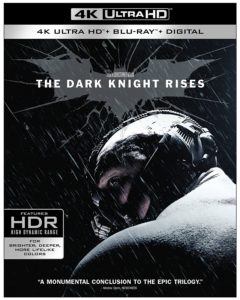 Nolan’s triumphant conclusion in his Batman saga, THE DARK KNIGHT RISES (***½, 165 mins., 2012, PG-13), is a compelling, exciting piece of modern filmmaking – more of a direct sequel to its initial entry than its immediate predecessor.
Nolan’s triumphant conclusion in his Batman saga, THE DARK KNIGHT RISES (***½, 165 mins., 2012, PG-13), is a compelling, exciting piece of modern filmmaking – more of a direct sequel to its initial entry than its immediate predecessor.
Set several years after the events of TDK, Gotham City finds itself once again under siege – this time from a mercenary named Bane (Tom Hardy) who wears a mask and talks like a muffled version of Darth Vader by way of Sean Connery. The Batman hasn’t been seen since the night of Harvey Dent’s death, with Bruce Wayne (Christian Bale, seeming less uptight this time around) hiding out as a recluse in Wayne Manor, much to the chagrin of Alfred (Michael Caine), who just wants to see his master join the ranks of the living again. Bruce’s world is initially perked up by a cat burglar named Selina Kyle (Anne Hathaway), who’s gotten herself wrapped up in the new world order that Bane’s “Occupy Gotham” army represents – but it’s just a teaser for the resurrection of Batman himself, who’s desperately needed by its residents and a beleaguered Commissioner Gordon (Gary Oldman), who finds a new ally in crusading young cop John Blake (Joseph Gordon-Levitt).
“The Dark Knight Rises” is confident, visually compelling and just a bit overlong. The script, by Nolan and his brother Jonathan, is better balanced than the redundant structure of “The Dark Knight,” which found Batman continuously trying to save Gotham, only to be thwarted by a psychotic act from The Joker. This picture is less sadistic as well, with more of a redemptive finale that proves to be enormously satisfying as Nolan at last breaks out of the constant doom and gloom that the last picture was dominated by.
Most of the additions to the cast help enormously, from Hathaway’s fetching turn as Catwoman and Gordon-Levitt’s tireless police detective, to welcome on-screen appearances by veteran actors Matthew Modine and William Devane, and a few surprise cameos from veterans of Nolan’s earlier Batman pictures. Bane himself is a little goofy, but Hardy packs a muscular presence, and series veterans Caine and Oldman have several fine scenes as well. Less effective is Marion Cotillard’s red herring role as the new head of Wayne Enterprises and Bruce’s latest love conquest – given where the story ultimately concludes, there should have been more of the relationship between Bruce and Selina, though romanticism has never been one of Nolan’s strong suits.
A few elements also fall short – a somewhat bloated stretch where Bruce finds himself in Bane’s prison drags the film down with Batman sidelined for too long a duration (ironic that, no matter if it’s Burton, Schumacher or Nolan, the focus always seems to drift off the Caped Crusader in every one of these pictures). There’s a bit too much Bane and several pretentious, accompanying monologues, while Hans Zimmer’s ridiculously over-scored soundtrack feels the need to punctuate every scene – even the quieter dramatic beats – like a sledgehammer.
Still, the film provides a rousing conclusion to one of the most epic super-hero stories ever told on-screen, with the director ending his series with some light finally infiltrating the darkness.
4K Rundown: Warner’s 4K UHD presentation of “The Dark Knight Rises” surpasses an already robust Blu-Ray transfer, matched here with HDR enhancements and DTS MA audio. The film visually looks tremendous, though viewers again should be aware that nearly a third of the transfer preserves its Imax-shot dimensions – meaning the aspect ratio shifts from 2.40 to full 16:9.
Warner’s UHD Christopher Nolan bundle is accompanied here by corresponding Blu-Ray presentations of all seven films (in fact, “The Prestige” is a new BD encode featuring 5.1 DTS MA audio) and supplemental Blu-Rays, housing the respective extras from each film’s prior BD release (these include the extensive extras from the Batman special editions, for example). Viewers should note that Digital HD copies are included only in the separate UHD releases of each picture. Nevertheless, the set comes highly recommended.
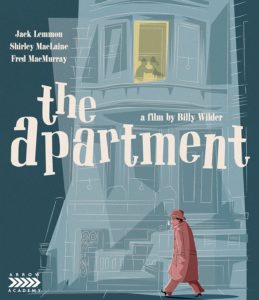 New & Upcoming Releases
New & Upcoming Releases
THE APARTMENT – Limited Edition Blu-Ray (120 mins., 1960; Arrow Video): Arrow closes out a marvelous year in the North American market with a deluxe boxed set of Billy Wilder’s 1960 classic. Reuniting Wilder with star Jack Lemmon, “The Apartment” was one of the duo’s most celebrated works, winning five Oscars including Best Picture, and pairing Lemmon with Shirley MacLaine in what became an instant favorite that’s weathered the years well. Arrow’s Limited Edition set offers a brand new 4K restoration of the film, produced exclusively for this release, that preserves the movie’s wide 2.35 frame in a superbly detailed B&W transfer. Uncompressed PCM mono sound and a 5.1 DTS MA remix comprise the audio offerings with extras including Philip Kemp’s appreciation of the film and selected-scene commentary; a video essay by David Cairns on the Wilder/Lemmon teaming; a talk with actress Hope Holiday; an archival Writer’s Guild interview with Wilder; a 2007 video retrospective; another 2007 piece on Jack Lemmon; the trailer; and collector’s packaging that includes a 150-page book. Highly recommended!
KINGSMAN: THE GOLDEN CIRCLE 4K UHD Combo Pack (**, 141 mins., 2017, R; Fox): Matthew Vaughn returns for another go-around after his uneven but generally fun 2014 spy spoof. This even more hit-or-miss, bloated follow-up offers sporadic laughs – mostly involving a kidnapped Elton John and the Kingsmen’s American counterparts, played by the likes of Channing Tatum and Jeff Bridges – but is overstuffed with plot elements that are either downright silly or not funny at all. The latter is present in the form of a villainess played by Julianne Moore who pushes drugs from a remote island that she’s remade in the form of ‘50s American nostalgia like “Happy Days” and “American Graffiti.” Why? Because Vaughn thinks it’s funny, apparently. Though much of his filmmaking output has been highly varied, Vaughn has generally hit more targets than he misses here, making for a sequel that’s likely to test the patience of even fans of the original. Fox’s 4K UHD of “Kingsman 2” does look marvelous: HDR accentuates Vaughn’s color scheme, with rollicking Dolby Atmos audio making for a robust 4K visual package. In addition to the Blu-Ray and a DVD copy, extras include a behind-the-scenes documentary and other supplemental featurettes.
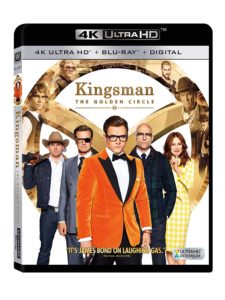 THE STRAIN – The Complete Series DVD (2024 mins., Fox): Complete Series box-set houses the entire four-season run of the FX contemporary vampire series. Fox’s package includes all 46 episodes of “The Strain” scattered across 14 discs with all of its extensive special features (commentaries, featurettes, music videos, interviews) – the bad news, though, is that there’s no Blu-Ray release of a series whose visuals are at least a major part of its appeal.
THE STRAIN – The Complete Series DVD (2024 mins., Fox): Complete Series box-set houses the entire four-season run of the FX contemporary vampire series. Fox’s package includes all 46 episodes of “The Strain” scattered across 14 discs with all of its extensive special features (commentaries, featurettes, music videos, interviews) – the bad news, though, is that there’s no Blu-Ray release of a series whose visuals are at least a major part of its appeal.
LUKE CAGE: The Complete First Season Blu-Ray (693 mins., 2017; Marvel/ABC): Netflix remains the place for all of your R-rated Marvel Comics needs, as this latest series adapted from fan-favorite, yet seemingly less popular, Marvel material attests. Mike Colter is perfectly cast as Cage, the steel-eyed tough-guy with unbreakable skin and superhuman strength, framed for a crime he didn’t commit and recently sprung from prison. His run-ins with crime boss Cornell “Cottonmouth” Stokes comprise most of the action in Season 1 of “Luke Cage,” now on Blu-Ray from Buena Vista featuring 1080p transfers and 5.1 DTS MA sound. “Offstage at Harlem’s Paradise” is the key supplement of note here, offering interviews with Colter and co-stars Alfre Woodard, Theo Rossi and Simone Missick.
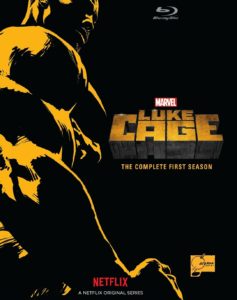 MANHUNT: UNABOMBER Blu-Ray (6 hours, 2017; Lionsgate): Discovery Channel dramatic series retells the life and times of Ted Kaczynski (Paul Bettany), aka the Unabomber, and how an FBI agent (Sam Worthington) pioneered forensic linguistics to catch him. Bettany is really good here – convincing and chilling – and Worthington makes for a stalwart hero, but this crime procedural is pretty much standard-issue stuff for the most part, blandly executed at that. Lionsgate’s Blu-Ray boasts a crisp 1080p (1.78) transfer with 5.1 DTS MA sound and three featurettes, plus a Digital HD copy.
MANHUNT: UNABOMBER Blu-Ray (6 hours, 2017; Lionsgate): Discovery Channel dramatic series retells the life and times of Ted Kaczynski (Paul Bettany), aka the Unabomber, and how an FBI agent (Sam Worthington) pioneered forensic linguistics to catch him. Bettany is really good here – convincing and chilling – and Worthington makes for a stalwart hero, but this crime procedural is pretty much standard-issue stuff for the most part, blandly executed at that. Lionsgate’s Blu-Ray boasts a crisp 1080p (1.78) transfer with 5.1 DTS MA sound and three featurettes, plus a Digital HD copy.
KILLING GUNTHER Blu-Ray (93 mins., 2017, R; Lionsgate): Vanity project from one of Saturday Night Live’s unfunniest cast members in recent memory, “Killing Gunther” marks an inauspicious directorial debut for Taran Killam. Killam also wrote and stars in this tale of a group of assassins who kidnap a reality crew in the hopes they can capture them knocking off a notorious hitman. Plenty of familiar faces (Killam’s wife, Cobie Smulders, and SNL castmate Bobby Moynihan) pop up but this labored farce is a real waste of time…at least until Arnold Schwarzenegger shows up at the end to provide a few actual laughs. Whether or not anyone actually gets there is the real question involved in “Killing Gunter,” which comes to Blu-Ray this week from Lionsgate featuring a 1080p transfer, 5.1 DTS MA sound, deleted scenes, bloopers and a Digital HD copy.
TERMINATOR 2: JUDGMENT DAY 4K UHD (***, 137 mins., 1991, R; Lionsgate): Uneven 4K UHD edition of James Cameron’s 1991 blockbuster occasionally looks better than its last Blu-Ray release (a Van Ling-produced 2014 edition also included here), though it doesn’t always show off the benefits of HDR. In fact, there are times the UHD looks scarcely different than the Blu-Ray, with a drab transfer and an overly glossy, DNR-riddled appearance. Fans may still prefer this to any prior video release, but it’s not the big remastered package the film deserves.
Lionsgate’s UHD includes just the theatrical cut of T2 along with DTS MA audio and a Digital HD copy. Those looking for extras can find them in the Blu-Ray, offering both the Special Edition of the film and the theatrical version, as well as the “extended Special Edition” with the “conclusive” futuristic ending that was excised shortly before the film’s release. The massive amounts of supplements from ancient home video releases are also a hoot to revisit.
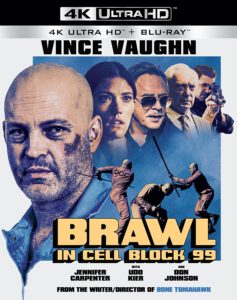 BRAWL IN CELL BLOCK 99 4K UHD Blu-Ray Combo Pack (132 mins., 2017, Not Rated; RLJ): Grizzly and not particularly convincing new film from “Bone Tomahawk” director S. Craig Zahler manages to be both overlong and undernourished when it comes to character development. Attempting a change of pace, Vince Vaughn plays a bald ex-boxer caught in the wrong place at the wrong time, and ends up having to navigate the penal system in order to save his pregnant wife (Jennifer Carpenter). Things play out slowly – very slowly – in a movie that doesn’t even get to its title incident until the end. Until then, Vaughn postures, winks a few times and beats a few guys to a pulp – but what’s the point? Don Johnson (yes!) co-stars as one of several sadistic folks Vaughn encounters in this depressing, slow-moving affair. RLJ’s 4K UHD is attractively detailed though does not include HDR; its DTS MA soundtrack is shared by the standard Blu-Ray with a cast/crew Q&A and featurette rounding out the package…Also new on UHD from RLJ this week to close out 2017 is MAYHEM (87 mins., 2017), Joe Lynch’s film starring Steven Yeun (“The Walking Dead”) as a man who finds out he’s been fired from his law firm — and that a dangerous virus, causing victims to act out their wildest impulses, has been unleashed inside. Not really a zombie movie but an interesting and over-the-top variation on one, “Mayhem” is at least a cut-above for this kind of thing, with Yeun and Samara Weaving doing good work inbetween the blood, sex and general craziness Lynch infused in his “Wrong Turn” sequels. RLJU’s UHD looks fine albeit minus HDR, with 5.1 DTS MA audio and a Making Of featurette also included plus the standard Blu-Ray.
BRAWL IN CELL BLOCK 99 4K UHD Blu-Ray Combo Pack (132 mins., 2017, Not Rated; RLJ): Grizzly and not particularly convincing new film from “Bone Tomahawk” director S. Craig Zahler manages to be both overlong and undernourished when it comes to character development. Attempting a change of pace, Vince Vaughn plays a bald ex-boxer caught in the wrong place at the wrong time, and ends up having to navigate the penal system in order to save his pregnant wife (Jennifer Carpenter). Things play out slowly – very slowly – in a movie that doesn’t even get to its title incident until the end. Until then, Vaughn postures, winks a few times and beats a few guys to a pulp – but what’s the point? Don Johnson (yes!) co-stars as one of several sadistic folks Vaughn encounters in this depressing, slow-moving affair. RLJ’s 4K UHD is attractively detailed though does not include HDR; its DTS MA soundtrack is shared by the standard Blu-Ray with a cast/crew Q&A and featurette rounding out the package…Also new on UHD from RLJ this week to close out 2017 is MAYHEM (87 mins., 2017), Joe Lynch’s film starring Steven Yeun (“The Walking Dead”) as a man who finds out he’s been fired from his law firm — and that a dangerous virus, causing victims to act out their wildest impulses, has been unleashed inside. Not really a zombie movie but an interesting and over-the-top variation on one, “Mayhem” is at least a cut-above for this kind of thing, with Yeun and Samara Weaving doing good work inbetween the blood, sex and general craziness Lynch infused in his “Wrong Turn” sequels. RLJU’s UHD looks fine albeit minus HDR, with 5.1 DTS MA audio and a Making Of featurette also included plus the standard Blu-Ray.
THE HOUSES OCTOBER BUILT 2 Blu-Ray (101 mins., 2017, R; RLJ): Sequel to the indie-horror effort finds five friends trying to recover from their experience being kidnapped by the Blue Skeleton – a group that puts the “Extreme” in “Extreme Haunt” – when they see signs of their experience again, even while they head out on a new series of haunted house adventures. Fans of the original “Houses” should enjoy this sequel RLJ has brought to Blu-Ray featuring a 1080p transfer, 5.1 DTS MA sound, deleted scenes, an uncut “projection scene,” the “Halloween Spooks” music video and additional goodies.
 THE ADVENTURERS Blu-Ray (108 mins., 2017, Not Rated; Well Go USA): Hong Kong import stars Andy Lau, Yo Yang and Shu Qi as thieves who find themselves running throughout Europe after joining forces to pull off a big heist. In hot pursuit is a dogged French detective – Jean Reno! – whose appearance tries to give more of an international flair to a stylish albeit formulaic HK production. Well Go’s Blu-Ray/DVD combo pack is out January 2nd featuring a Making Of featurette, the trailer, a 1080p transfer and 5.1 DTS X audio (Mandarin with English subtitles)…Coming January 9th from Well Go is BAD DAY FOR THE CUT (99 mins., 2016), a revenge thriller about a farmer who treks through Belfast looking for the killers who murdered his mother. He ultimately unearths difficult truths about her, and himself, in this Irish import Well Go bows on Blu-Ray January 9th. The 1080p transfer and DTS MA audio are both fine.
THE ADVENTURERS Blu-Ray (108 mins., 2017, Not Rated; Well Go USA): Hong Kong import stars Andy Lau, Yo Yang and Shu Qi as thieves who find themselves running throughout Europe after joining forces to pull off a big heist. In hot pursuit is a dogged French detective – Jean Reno! – whose appearance tries to give more of an international flair to a stylish albeit formulaic HK production. Well Go’s Blu-Ray/DVD combo pack is out January 2nd featuring a Making Of featurette, the trailer, a 1080p transfer and 5.1 DTS X audio (Mandarin with English subtitles)…Coming January 9th from Well Go is BAD DAY FOR THE CUT (99 mins., 2016), a revenge thriller about a farmer who treks through Belfast looking for the killers who murdered his mother. He ultimately unearths difficult truths about her, and himself, in this Irish import Well Go bows on Blu-Ray January 9th. The 1080p transfer and DTS MA audio are both fine.
LUCKY DVD (88 mins., 2017, Not Rated; Magnolia): Harry Dean Stanton bids adieu to a wide-ranging film career in this independent film directed by actor John Carroll Lynch. Here, Stanton plays a character at the end of his life still living towards personal enlightenment, despite the loss of many of his friends. Ron Livingston, David Lynch, Ed Begley Jr., Tom Skerritt and James Darren are a few of the familiar faces who appear in “Lucky,” coming to DVD January 2nd from Magnolia. Interviews, a 16:9 transfer and 5.1 Dolby Digital sound make for a fine release well worth viewing for Stanton fans.
Film Movement New Releases: Film Movement has two upcoming titles worth checking out for independent/foreign cinema fans. On January 9thcomes THE TEACHER (103 mins., 2017), Jan Hrebejk and Petr Jarchovsky’s Czech film about a teacher in the early ‘80s who hands out grades to her students based on the favors she receives from their parents. Christophe Saber’s short “Sacrilege” is one of the extras in Film Movement’s DVD along with a 16:9 transfer and 5.1 Dolby Digital sound (Slovak with English subtitles)…Available January 2nd is SHADOWMAN (82 mins., 2017), the story of Richard Hambleton – a street artist on the Lower East Side as captured by director Oren Jacoby. Hambleton contributed original animation for this documentary, which also features over a half-hour of bonus footage in Film Movement’s good-looking (16:9, 5.1) DVD edition.
NEXT TIME: Kino Lorber ushers in 2018 with January Studio Classics including the sizzling Michael Caine they’d-never-make-it-today comedy BLAME IT ON RIO! Until then, don’t forget to drop in on the official Aisle Seat Message Boards and direct any emails to our email address. Cheers everyone!














 Picking up from the conclusion of the more satisfying (if less ambitious) J.J. Abrams-directed “The Force Awakens,” writer-director Johnson’s outing finds Rey (Daisy Ridley) trying to make contact with Luke Skywalker (an effective Mark Hamill) and convince him to help the Rebellion – err, Resistance – against the Empire – or First Order, as it’s now called. Meanwhile, bad-boy Kylo Ren’s (Adam Driver) allegiances are tested as he encounters supreme commander Snoke (a lame CGI creation embodied by Andy Serkis) while Leia’s efforts with the Resistance mostly revolve around convincing hot-head pilot Poe Dameron (Oscar Isaac) to cool his jets. In the “We Didn’t Really Need To Shoot This Department,” John Boyega’s ex-stormtrooper Finn (John Boyega) is back, partnered with a female mechanic (Kelly Marie Tran) as the duo fly to an intergalactic casino in order to find a safecracker (an awful performance from Benicio Del Toro, who looks like he’s just wandered off the set from his latest Heineken commercial) who can help shut down a First Order tracking device.
Picking up from the conclusion of the more satisfying (if less ambitious) J.J. Abrams-directed “The Force Awakens,” writer-director Johnson’s outing finds Rey (Daisy Ridley) trying to make contact with Luke Skywalker (an effective Mark Hamill) and convince him to help the Rebellion – err, Resistance – against the Empire – or First Order, as it’s now called. Meanwhile, bad-boy Kylo Ren’s (Adam Driver) allegiances are tested as he encounters supreme commander Snoke (a lame CGI creation embodied by Andy Serkis) while Leia’s efforts with the Resistance mostly revolve around convincing hot-head pilot Poe Dameron (Oscar Isaac) to cool his jets. In the “We Didn’t Really Need To Shoot This Department,” John Boyega’s ex-stormtrooper Finn (John Boyega) is back, partnered with a female mechanic (Kelly Marie Tran) as the duo fly to an intergalactic casino in order to find a safecracker (an awful performance from Benicio Del Toro, who looks like he’s just wandered off the set from his latest Heineken commercial) who can help shut down a First Order tracking device. Nolan in 4K
Nolan in 4K A few lines intended to convey the scattershot nature of war are thrown around here and there, but nothing is developed as Nolan spends most of the film showing an assault of near-misses and dire confrontations with “The Enemy,” including aerial dogfights that are surprisingly disjointed in their editorial presentation. The “story”, meanwhile, crosscuts between several characters — Mark Rylance’s pleasure boater, corralled into participating in the evacuation; Tom Hardy’s ace fighter pilot; Kenneth Branagh’s concerned admiral, and a young solider, played by Fionn Whitehead, whom most of the action revolves around — but somehow never connects together, making for a film that manages to be tense without ever really being suspenseful. And then it just ends.
A few lines intended to convey the scattershot nature of war are thrown around here and there, but nothing is developed as Nolan spends most of the film showing an assault of near-misses and dire confrontations with “The Enemy,” including aerial dogfights that are surprisingly disjointed in their editorial presentation. The “story”, meanwhile, crosscuts between several characters — Mark Rylance’s pleasure boater, corralled into participating in the evacuation; Tom Hardy’s ace fighter pilot; Kenneth Branagh’s concerned admiral, and a young solider, played by Fionn Whitehead, whom most of the action revolves around — but somehow never connects together, making for a film that manages to be tense without ever really being suspenseful. And then it just ends. It’s tough to rag too much on a sci-fi film that does, at least, attempt to tell a genuine story augmented with “real science” in today’s age of mindless comic book fantasies. On the other hand, is it too much to ask for a film like Nolan’s
It’s tough to rag too much on a sci-fi film that does, at least, attempt to tell a genuine story augmented with “real science” in today’s age of mindless comic book fantasies. On the other hand, is it too much to ask for a film like Nolan’s  INCEPTION (**½, 148 mins., 2010, PG-13):
INCEPTION (**½, 148 mins., 2010, PG-13): Inbetween the first and second installments in his Batman trilogy, Nolan helmed
Inbetween the first and second installments in his Batman trilogy, Nolan helmed BATMAN BEGINS (***, 140 mins., 2005, PG-13):
BATMAN BEGINS (***, 140 mins., 2005, PG-13): THE DARK KNIGHT (***, 151 mins., 2008, PG-13):
THE DARK KNIGHT (***, 151 mins., 2008, PG-13): Nolan’s triumphant conclusion in his Batman saga,
Nolan’s triumphant conclusion in his Batman saga, 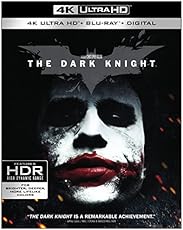

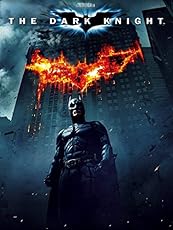


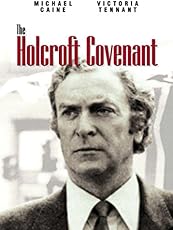


 New & Upcoming Releases
New & Upcoming Releases THE STRAIN – The Complete Series DVD (2024 mins., Fox):
THE STRAIN – The Complete Series DVD (2024 mins., Fox): MANHUNT: UNABOMBER Blu-Ray (6 hours, 2017; Lionsgate):
MANHUNT: UNABOMBER Blu-Ray (6 hours, 2017; Lionsgate): BRAWL IN CELL BLOCK 99 4K UHD Blu-Ray Combo Pack (132 mins., 2017, Not Rated; RLJ):
BRAWL IN CELL BLOCK 99 4K UHD Blu-Ray Combo Pack (132 mins., 2017, Not Rated; RLJ): THE ADVENTURERS Blu-Ray (108 mins., 2017, Not Rated; Well Go USA):
THE ADVENTURERS Blu-Ray (108 mins., 2017, Not Rated; Well Go USA):
